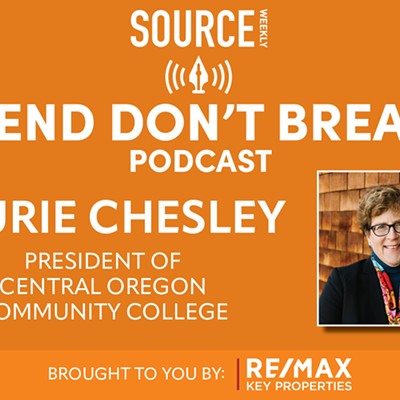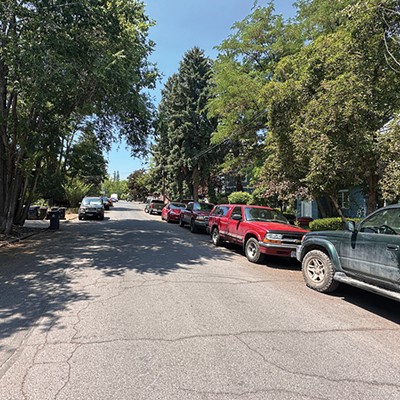Five buildings soaring as tall as 74 feet, with brick facades and top-of-the-line interiors. A bustling ground-floor mixture of restaurants, bistros, food shops and kitchen stores. Offices on the middle floors for lawyers and architects, engineers and designers. And, capping it all off, a series of top-drawer condos, complete with million-dollar pricetags and sweeping views of the mountains beyond and the Old Mill District below.
That's still the dream, Trono says.
But here in the muddy days of 2008, with the housing market in the tank and the banks running scared from speculative real estate deals, Trono says his land - the former site of the Brooks-Scanlon Mill's hulking red crane shed - is likely to remain just what it is for another year: A flattened field of weedy gravel, waiting for better days.
"There is so much fear in the residential market, I'm glad I don't have product out there right now," Trono said last week. "I haven't seen a market like this since the early 80s. There is a lot of confusion. A lot of fear."
Enough so that most of the Field of Dreams ideas that flooded Bend in the latter years of the housing boom seem destined for a long wait before their first bricks rise above the ground.
Old Mill District developer Bill Smith doesn't claim to have any insider knowledge of the big projects that are lagging around town. But the source of angst seems pretty obvious - after the collapse of Wall Street's investor-based credit markets last summer, financing of all types has become tougher to get, and developers who can get it are finding that it's coming with a lot more strings attached. Particularly on big projects that depend on residential condos to make their profit and cash flow scenarios work.
"Financing is just really tough right now," Smith said. "Boy, it's just really tough. That's not saying it's impossible, but if the project depends on selling condos to succeed, you've got a rough road ahead."
HOLES IN THE TOWN
The pockmarks of projects that started with great fanfare, then slowed to a crawl or ground to a halt, are scattered throughout town.
There's the scraped dust that surrounds the Bend Brewing Company's restaurant and pub on downtown Bend's Brooks Street. Once slated to be the site of high-end condos and retail shops, it sits empty with a "for sale" sign on it, the victim of protracted battles with City Hall and the slumping real estate markets.
Empty lots dot both ends of downtown's Bond Street. Major projects on both sides of the Old Mill District - a $127 million hotel/condo proposal on one end, and a sprawling retail and residential condo project on the other - remain unstarted.
And in east Bend, the backers of an ambitious new retail and office project with 800 proposed condos, townhomes and apartment units at the intersection of 15th Street and Wilson Avenue are taking their time getting city approvals, partner and real estate broker Sandy Garner said, hoping to come out of the ground in better times.
As land and construction prices rose during the housing boom, particularly in the downtown corridor, residential condos became a sort of magic elixir that could make projects pencil out even as costs escalated beyond the point at which commercial rents and leases could justify them, Compass Commercial Real Estate Services principal broker Bruce Kemp said. The condo portion let the developer, in effect, sell a piece of the building, recouping equity and defraying some of the cost of building office and retail space for lease on the lower floors.
In projects like Garner's planned community in east Bend, condos and townhome sales promised to provide quick buildouts and sales, keeping cash flows up while longer-term commercial projects were completed in the core.
That all, of course, depended on the ability to sell residential condos, and the example set by a couple of major projects set a chill on that prospect as the housing boom of early 2006 withered into the market frosts of 2007.
MARKET-BIT
Franklin Crossing, the five-story retail, office and condo complex at the corner of Bond Street and Franklin Avenue in downtown Bend, was the first mixed-use building in town to come onto the market with luxury residential condos when it gained legal approval to sell them in December 2006.
The prospects for the building's eight upper floor units looked great when real estate agent Norma DuBois solicited "reservations" in the spring of that year. Investors and second-home buyers lined up two and three deep to put their names - but no cash - down for each unit, despite initial pricetags that ran between $500,000 and $1.4 million.
By the time all the legal paperwork was in place to finalize sales in December, though, the market had turned, DuBois said. It has taken more than a year and a quarter now to sell five of the eight units, at greatly reduced prices. One unit, once listed at $525,000, actually sold for $370,000. One of the three that remains for sale was once listed at $650,000. Now it's priced at $590,000.
"We're probably doing better than most of the rest of the condo projects are," said Patrick Oliver, a commercial real estate broker and one of the building's developers, "But I'm glad we didn't build any more than eight of them."
About a half a mile to the south, in the heart of the Old Mill District, real estate broker Becky Breeze and her husband, developer Tom Wurzel, did build a lot more than eight, betting, as Breeze said in 2006, that second -home buyers and retirees would flock to buy into a high-rise condo project with units on single floors and sweeping views of the Old Mill District and the Cascades.
If county records are any indication, they bet wrong.
With only four of 42 units sold by late 2007, trouble arose when a collection of contractors and subcontractors filed liens on The Plaza, the towering condo project on Bluff Drive that Breeze and Wurzel's company, Harvest LLC, finished in July, according to records on file in the Deschutes County Clerk's Office.
By February, Breeze and Wurzel had deeded over their interests to Plaza Bend LLC, an entity controlled by the Seattle-based real estate investment firm Goodman Real Estate.
Goodman washed Umpqua Bank out of the deal, county record trails show, taking over the $20.316 million line of credit the bank had set with Breeze and Wurzel for only about $7 million.
Breeze and Wurzel failed to return multiple phone messages left by The Source last week. But Goodman asset manager Julie Clark said Plaza Bend LLC plans to finish the interiors of the remaining condos and continue to market them to the same demographic sectors that Breeze and Wurzel were aiming for in the first place.
This time, according to county records, Plaza Bend will be armed with a $12.6 million line of credit from Australia-based Macquarie Bank Lmtd. Umpqua released its last remaining interest in the building to Plaza Bend on March 25.
"It's a unique product," Clark said. "An iconic product in the heart of Bend. It's not sitting in downtown Portland competing with hundreds of other projects just like it."
It's also a product that was picked up, if the county records are any indication, at a price below its final production cost, a factor that will significantly reduce the risk for its new investors.
And a factor that goes a long way towards explaining why most banks, not to mention developers and equity investors, are growing considerably more cautious before they will jump into a new speculative project that includes condos in the mix.
Even if they are inclined to jump back in someday.
"The Bend market has been hit hard, there's no question about it," Umpqua President Ray Davis said, refusing to discuss the hit his bank took on The Plaza or on any other specific Central Oregon projects in recent months. "Still - this is just my crystal ball, and it's no better than any other crystal ball - I think Bend will be one of those markets that will bounce back faster than most because of the overall intrinsic quality of living rhere."
TIGHT MONEY
The national credit pinch is making itself felt on Bend's big projects in a couple of ways, Trono said.
Equity investors - whether they are wealthy individuals or investment consortiums - are generally demanding bigger profit potentials before they'll jump in, he said, which means they are demanding more equity for less money, jacking the typical "internal rate of return" up from the 15 percent or so they would settle for last summer to 25 or 30 percent this year.
Depending on the projects, banks are demanding higher rates of preleasing on retail and office components, Trono said, and they are slapping much tougher restrictions on the original developers' ability to operate, requiring, for example, that no condos be sold below a certain price without prior bank permission.
"Their underwriting requirements have become such that it's very prohibitive to do a deal," Trono complained. "What they are really doing is taking away your tools."
Big, speculative projects are also facing stiff competition for investor dollars from a seemingly unlikely source, Kemp said - the residential land market. With subdivisions selling off, in some cases, for 50 to 60 cents on the dollar, investors can lock in big potential gains by buying distressed properties rather than sinking their funds into as-yet unproven mixed-use projects in the city's trendiest neighborhoods.
So that is leaving the region's big-project developers to muddle through as best they can.
Trono said he has abandoned his initial plan to develop The Mercato himself with help from consultants in favor of looking for a development partner who has experience with similarly large projects in other markets - in other words, a big equity partner who comes with their own financing sources and a track record that could help calm the fears of other potential lenders and investors.
He said he expects to break ground late this year to make curb cuts and pull utility lines into the project. That will produce enough work on the site to keep the project's city approvals from expiring, he said, but building won't begin in earnest until at least 2009, shooting for a completion date sometime in 2011. If it takes longer, that's OK, Trono said - he'd rather wait than change the project's basic design.
"The reasons we set out to do The Mercato still exist," he said, "but now is too restrictive a time."
Over on the east side, Garner said she and her partners plan to file for their city permits in a month or so. If they win approval, the partners will likely start with the commercial components first, she said, rather than jumping straight into the residential fray.
Meanwhile downtown, where the old City Center Motel stood on Franklin Street, Rick Skinner and his partners are trying to come up with a new idea for their now-empty lot.
They originally planned to build more than 80 residential condos in a five-story building on it, with some retail space on the ground floor, according to plans filed with the city in April 2006. Today? It could become an office complex, Skinner said. It could get some condos if the residential markets turn around. The partners have discussed making half of it into a parking garage to help ease the downtown's on-street parking crunch.
The partners on the City Center site have at least eight months to decide what to do with the lot before their city permits threaten to expire, Skinner said. Nothing is likely to happen before that, he said, but he said that he, too, is unlikely to cut loose from his land.
"Some of these guys are sticking their heads between their tails and running...," Skinner said. "I have no doubt that Bend is still going to be ahead of the game, once things start to pick up."
That may be, said the Old Mill's Smith, who had spent a long career in real estate even before he bought the old Brooks-Scanlon Mill in the 1990s and started its transformation into the iconic retail and office center it is today. But it will take money to play.
"It's always nice when there are lots of lenders, " Smith said, adding "The market is saying there is more bad news to come."
So are we going to be looking at gravel lots for awhile yet?
"I'd hope not," Smith said. "But that's my bet."






















